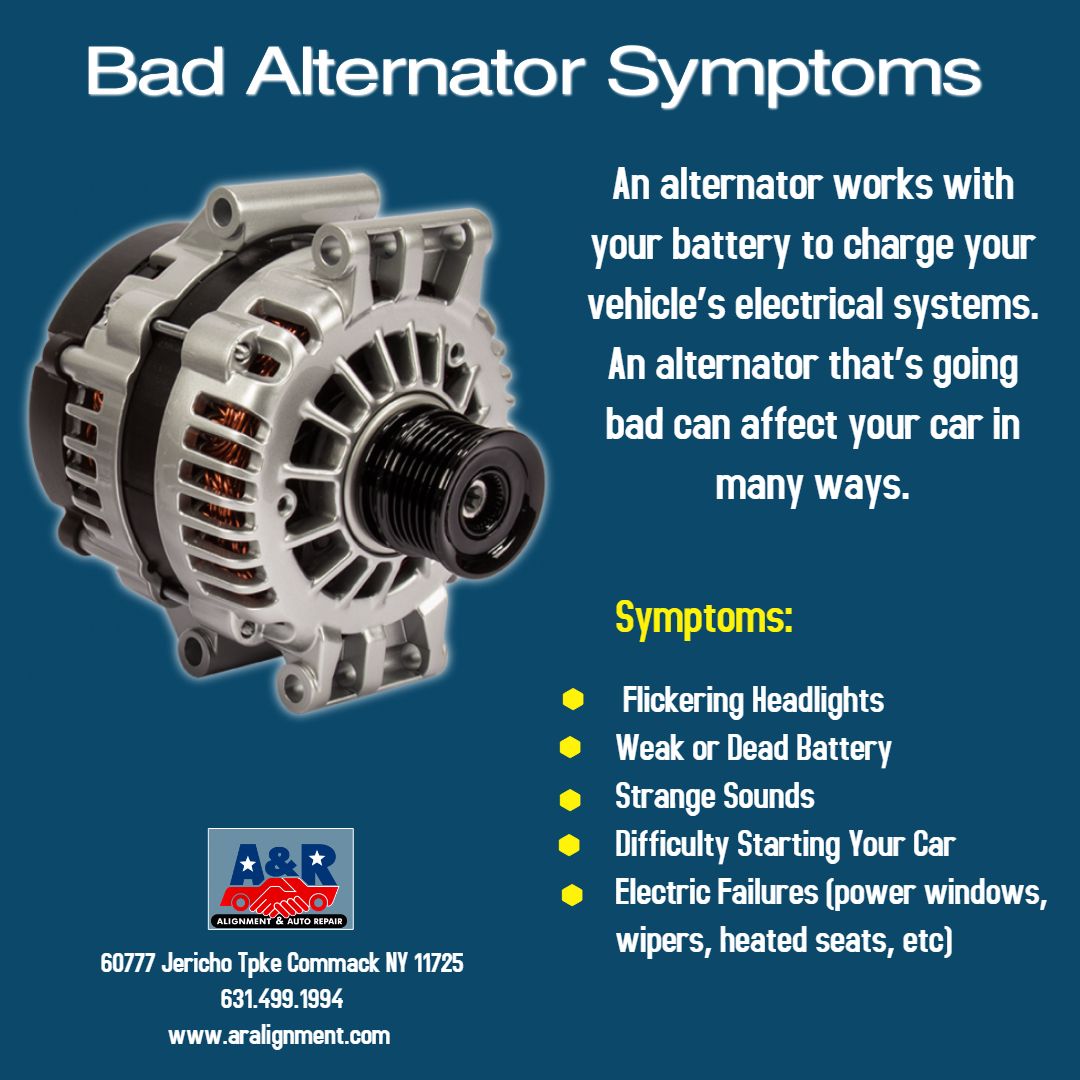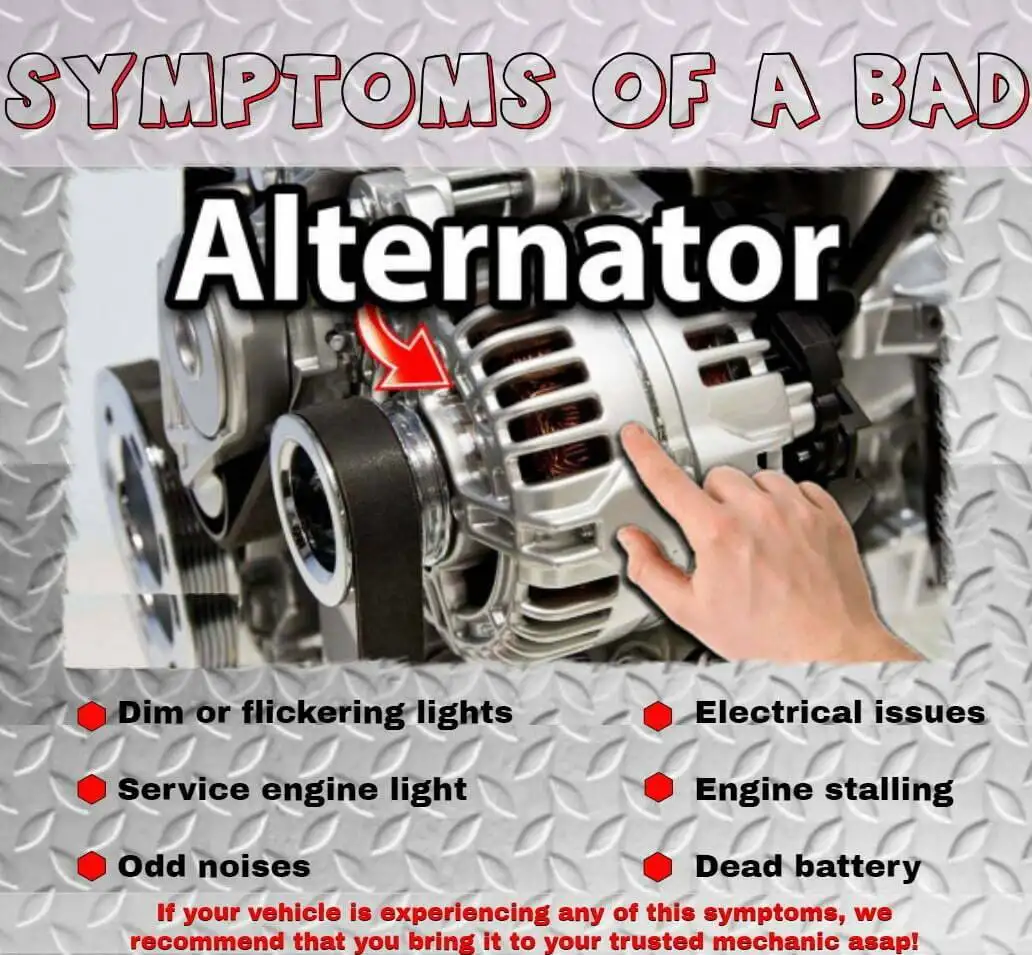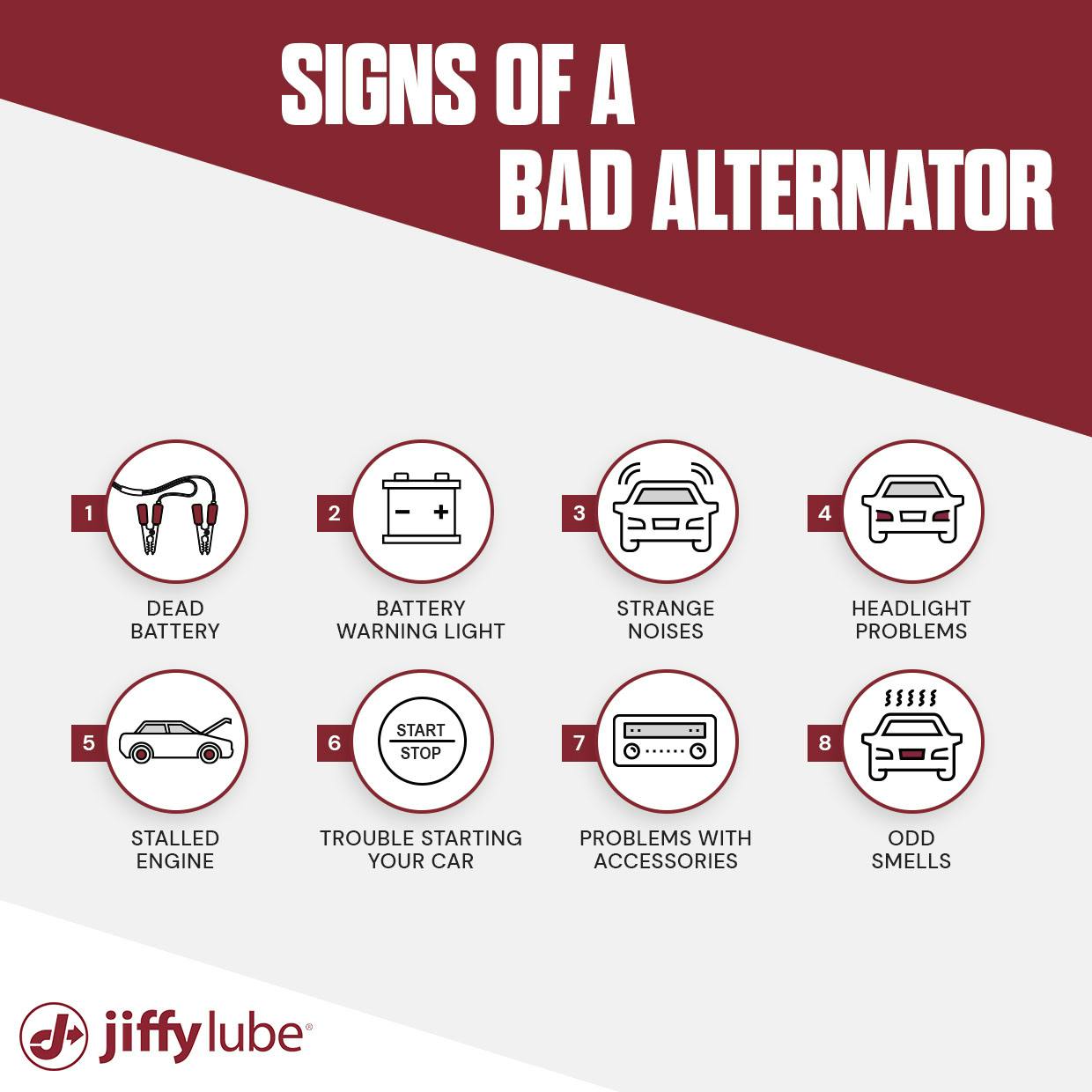Your car’s alternator is crucial. It powers your vehicle’s electrical systems.
Without it, your car won’t run properly. Are you noticing issues with your car’s performance? These could be signs of a failing alternator. Identifying these symptoms early can save you from unexpected breakdowns and costly repairs. In this post, we’ll explore the common signs that indicate your alternator might be in trouble.
Understanding these signs will help you take action before your car leaves you stranded. Let’s dive into the key indicators of a bad alternator, ensuring your vehicle remains reliable and safe on the road.

Credit: abdj.net
Dim Or Flickering Lights
Dim or flickering lights can be a clear sign of a bad alternator. Your vehicle’s electrical system relies heavily on the alternator. A failing alternator can cause various issues, including problems with lights. Let’s explore how this affects different lights in your car.
Headlights And Interior Lights
Headlights may dim or flicker if the alternator is failing. This happens because the alternator can’t supply consistent power. You might notice this more at night. Interior lights can also be affected. They may flicker or become unusually dim. This is a sign that your alternator may not be working properly.
Dashboard Lights
Dashboard lights can also show signs of a bad alternator. These lights may flicker or become dim. This can make it hard to read important information. Pay attention to any changes in your dashboard lights. They can help you catch alternator problems early.
Electrical Failures
Electrical failures can signal a bad alternator in your car. The alternator powers many of the car’s electrical components. When it fails, you may notice several issues. These problems can disrupt your driving experience and even compromise safety. Let’s explore some common electrical failures caused by a faulty alternator.
Power Windows And Seats
Power windows and seats may stop working properly. They might move slowly or not at all. This can be a sign that your alternator is not supplying enough power. A weak alternator can’t keep the battery charged. This affects the performance of power windows and seats.
Car Radio And Accessories
Car radio and other accessories may experience interruptions. You might hear static or the radio might shut off. Other accessories like phone chargers and GPS systems may also malfunction. A failing alternator can cause these electrical failures. It struggles to maintain power supply to these components.
Dead Battery
A dead battery is a common issue many drivers face. But did you know it can be a sign of a bad alternator? The alternator charges the battery and powers the car’s electrical systems. If it fails, the battery quickly loses its charge.
Frequent Jump-starts
Does your car need jump-starts often? This is a clear sign of a bad alternator. The battery isn’t getting charged, leaving it drained. Even if the battery is new, it won’t hold a charge. This frequent need for jump-starts indicates that the alternator might not be doing its job.
Battery Warning Light
Most cars have a battery warning light on the dashboard. If this light comes on, it means there’s a problem with the charging system. A bad alternator often triggers this warning. The light may flicker or stay on constantly. This is a strong indicator that the alternator isn’t working properly.
| Sign | Description |
|---|---|
| Frequent Jump-Starts | Needs jump-starts often due to lack of battery charge. |
| Battery Warning Light | Dashboard light indicates a problem with the charging system. |
A bad alternator can make driving stressful. Pay attention to these signs to avoid unexpected breakdowns.
Strange Noises
One of the first signs of a bad alternator is strange noises. These sounds can indicate that something is wrong with your car’s alternator. They are often unusual and can be quite noticeable.
Grinding Or Whining Sounds
Grinding or whining noises are common indicators of alternator problems. When you hear a grinding sound, it usually means that the bearings inside the alternator are wearing out. This can lead to a failure of the alternator, which will eventually affect your car’s electrical system.
Whining sounds, on the other hand, often point to issues with the voltage regulator. The voltage regulator controls the amount of power the alternator produces. If it fails, the alternator can produce too much or too little power, leading to a whining noise.
Belt Issues
The alternator is driven by a belt that connects to the engine. If you hear a squealing noise, it could be due to a loose or worn-out belt. A loose belt can slip, causing the alternator to undercharge the battery. A worn-out belt may also break, stopping the alternator from working altogether.
Regularly checking the belt for wear and tear can help you avoid bigger problems. Look for cracks, fraying, or other signs of damage. Replacing a damaged belt can prevent alternator failure and save you from costly repairs.
Engine Stalling
Engine stalling is a major sign of a bad alternator. The alternator charges the battery and powers the electrical system. When it fails, the engine can shut down unexpectedly. This can be dangerous and needs immediate attention.
Intermittent Stalling
Intermittent stalling means the engine stops running without warning. This can happen while driving. It could restart on its own or need you to restart it. This is often due to a faulty alternator. The alternator fails to provide a steady power supply, causing the engine to stall.
Difficulty Starting
Difficulty starting the engine is another sign of a bad alternator. You might hear a clicking sound when turning the key. The engine may crank slowly or not at all. This is because the battery doesn’t have enough charge. A bad alternator cannot recharge the battery properly. This leads to starting problems.
| Sign | Description |
|---|---|
| Intermittent Stalling | Engine stops running without warning |
| Difficulty Starting | Engine cranks slowly or not at all |
Address these signs quickly. A bad alternator can lead to more serious issues. Regular maintenance can prevent these problems. Keep your car’s electrical system in good condition. This ensures a smooth and safe driving experience.
Burning Smell
A burning smell from your car can be alarming. It often signals a serious issue. One possible cause is a bad alternator. The alternator is crucial for charging your car’s battery and powering electrical systems. When it fails, it can produce a distinctive burning odor. This section will explore two key reasons for this smell.
Electrical Burning Odor
An electrical burning odor often indicates a problem with the alternator. This smell is similar to burning plastic or rubber. It usually comes from the alternator’s internal components. If wires or other parts overheat, they can melt and emit this odor. This is a sign that the alternator is not functioning correctly.
Common causes of this issue include:
- Frayed wires
- Loose connections
- Overloaded circuits
Addressing these issues quickly can prevent further damage. It also helps avoid costly repairs.
Overheating Components
Another cause of a burning smell is overheating components. The alternator has many parts that can overheat. This includes the bearings, diodes, and voltage regulator. When these components get too hot, they can burn.
Signs of overheating components include:
- Smoke from the alternator
- High engine temperature
- Dim lights
These symptoms indicate that the alternator is struggling. It may not be able to keep up with the electrical demand. If you notice these signs, it is essential to have your car checked by a professional. Ignoring them can lead to a complete alternator failure.
Dashboard Warning Lights
One of the earliest indicators of a bad alternator is the dashboard warning lights. These lights are crucial for alerting you to potential issues with your vehicle. Paying attention to these warning signs can help you avoid being stranded on the road.
Battery Icon
Seeing the battery icon illuminate on your dashboard is a common sign of an alternator issue. This light usually appears as a small battery symbol. It may also include a “+” and “-” sign. If this light turns on, your vehicle’s electrical system is not getting enough power. This could mean your alternator is failing to charge the battery properly.
Check Engine Light
The check engine light can also indicate a problem with the alternator. While this light can point to various issues, a failing alternator is one of them. If you notice the check engine light along with other symptoms like dimming headlights, it’s time to get your alternator checked.

Credit: comtiresco.com
Slow Or Non-responsive Accessories
Slow or non-responsive accessories in your car can indicate a bad alternator. Your vehicle relies on the alternator to power electrical components. If the alternator fails, these accessories won’t work properly. This can lead to several issues while driving.
Ac And Heater
A malfunctioning alternator can cause your AC and heater to work poorly. You may notice the air isn’t as cool or warm as it should be. The blower might also run slower than usual. This happens because the alternator can’t supply enough power to these systems.
Windshield Wipers
Windshield wipers may move slower or stop working altogether. This can be dangerous during rain or snow. Slow wipers can reduce visibility, making it hard to see the road. If your alternator is failing, your wipers won’t get the power they need.

Credit: www.jiffylube.com
Frequently Asked Questions
What Are Common Signs Of A Bad Alternator?
Dim lights, dead battery, strange noises, and electrical issues are common signs of a bad alternator.
Can A Car Run With A Bad Alternator?
A car can run for a short while. Eventually, it will stop as the battery depletes.
How Does A Bad Alternator Affect The Battery?
A bad alternator can’t charge the battery. This causes the battery to drain quickly.
What Noises Indicate A Failing Alternator?
Grinding or whining noises can indicate a failing alternator. These sounds come from worn-out bearings or other components.
Can A Bad Alternator Cause Car Stalling?
Yes, a bad alternator can cause car stalling. The engine relies on the alternator for power.
Conclusion
Identifying signs of a bad alternator is crucial. Early detection prevents bigger issues. Listen for unusual noises. Check for dimming lights. Watch for warning lights on the dashboard. Notice any electrical problems. Don’t ignore strange smells. Regular maintenance helps keep your car running smoothly.
If you suspect an alternator issue, consult a mechanic. Stay safe on the road.

















